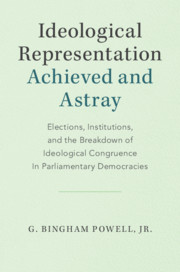
-
Select format
-
- Publisher:
- Cambridge University Press
- Publication date:
- 06 May 2019
- 09 May 2019
- ISBN:
- 9781108699785
- 9781108482141
- 9781108742139
- Dimensions:
- (228 x 152 mm)
- Weight & Pages:
- 0.5kg, 266 Pages
- Dimensions:
- (228 x 152 mm)
- Weight & Pages:
- 0.4kg, 268 Pages
You may already have access via personal or institutional login
Book description
Ideological congruence is the term generally used in comparative politics for the representative relationship between the general preferences of citizens and the perceived and stated position of government. This study provides a systematic comparative assessment of success and failure in achieving ideological congruence in nineteen developed parliamentary democracies from 1996 through to 2017. It then deconstructs the processes through which elections can connect citizens and governments into the three major stages: citizens' votes in parliamentary elections; the conversion of those votes into legislative representation; the election of prime ministers by their parliaments and the appointment of cabinet ministers. Analyzing these three stages shows that average distance from the median citizen increases at each stage, with only a few remarkable recoveries once congruence begins to go astray.
Contents
Metrics
Altmetric attention score
Full text views
Full text views help Loading metrics...
Loading metrics...
* Views captured on Cambridge Core between #date#. This data will be updated every 24 hours.
Usage data cannot currently be displayed.
Accessibility standard: Unknown
Why this information is here
This section outlines the accessibility features of this content - including support for screen readers, full keyboard navigation and high-contrast display options. This may not be relevant for you.
Accessibility Information
Accessibility compliance for the PDF of this book is currently unknown and may be updated in the future.


